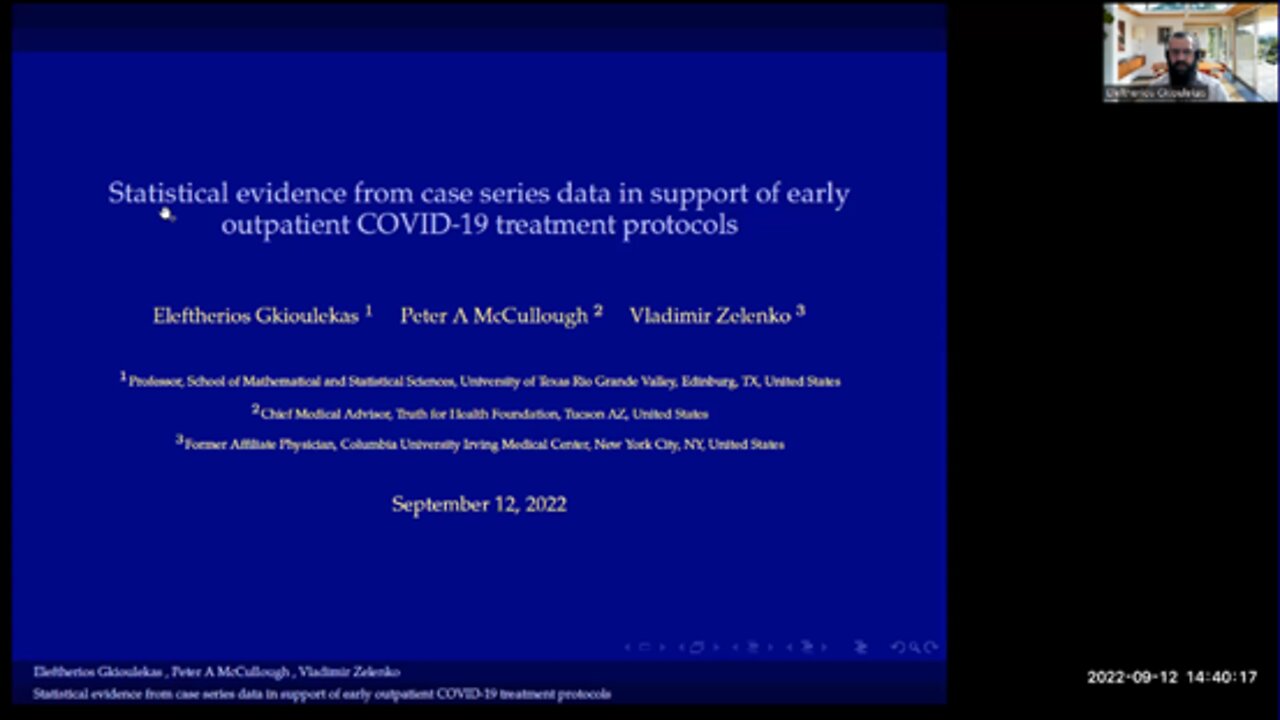Premium Only Content

Statistical evidence from case series data in support of early outpatient COVID-19 tx protocols
This is an extended presentation of our paper focusing on the statistical evidence in support of early outpatient treatment protocols for COVID-19. We give a non-mathematical intuitive explanation of the methodology and explain how it applies to the known results about early outpatient treatment protocols.
Download slides and video
https://faculty.utrgv.edu/eleftherios.gkioulekas/presentations/2022-early-tx-talk.html
Paper
E. Gkioulekas, P.A. McCullough, V. Zelenko: "Statistical analysis methods applied to early outpatient COVID-19 treatment case series data", COVID 2(8) (2022), 1139-1182
https://doi.org/10.3390/covid2080084
Abstract
When confronted with a public health emergency, significant innovative treatment protocols can sometimes be discovered by medical doctors at the front lines based on repurposed medications. We propose a statistical framework for analyzing the case series of patients treated with such new protocols, that enables a comparison with our prior knowledge of expected outcomes, in the absence of treatment. The goal of the proposed methodology is not to provide a precise measurement of treatment efficacy, but to establish the existence of treatment efficacy, in order to facilitate the binary decision of whether the treatment protocol should be adopted on an emergency basis. The methodology consists of a frequentist component that compares a treatment group against the probability of an adverse outcome in the absence of treatment, and calculates an efficacy threshold that has to be exceeded by this probability, in order to control the corresponding p-value and reject the null hypothesis. The efficacy threshold is further adjusted with a Bayesian technique, in order to also control the false positive rate. A random selection bias threshold is then calculated from the efficacy threshold to control for random selection bias. Exceeding the efficacy threshold establishes the existence of treatment efficacy by the preponderance of evidence, and exceeding the more demanding random selection bias threshold establishes the existence of treatment efficacy by the clear and convincing evidentiary standard. The combined techniques are applied to case series of high-risk COVID-19 outpatients that were treated using the early Zelenko protocol and the more enhanced McCullough protocol
-
 1:51:29
1:51:29
Eleftherios Gkioulekas -- Research and Commentary
1 year agoCritical appraisal of multi-drug therapy in the ambulatory management of hypoxemic COVID-19 patients
124 -
 UPCOMING
UPCOMING
Barry Cunningham
27 minutes agoMUST SEE: PAM BONDI AND KAROLINE LEAVITT MAKE REMARKS! | AND MORE NEWS!
-
 41:11
41:11
Donald Trump Jr.
19 hours agoMaking America Affordable Again, Interview with Economist Steve Moore | TRIGGERED Ep.294
58.4K60 -
 LIVE
LIVE
BonginoReport
1 hour agoThe Insane Proposal That Will Ruin Elections FOREVER - Nightly Scroll w/ Hayley Caronia (Ep.184)
2,470 watching -
 LIVE
LIVE
The Jimmy Dore Show
1 hour agoCandace Owens Faces “Credible” Assassination Threats! Massie CALLS OUT Israel-Epstein Connection!
4,293 watching -
 1:04:03
1:04:03
TheCrucible
3 hours agoThe Extravaganza! EP: 64 (11/24/25)
75.9K6 -

Kim Iversen
2 hours agoIsrael Running The Dept Of Homeland Security Social?!?
16.2K38 -
 LIVE
LIVE
Akademiks
1 hour agoSheck Wes exposes Fake Industry. Future Not supportin his mans? D4VD had help w disposing his ex?
937 watching -
 DVR
DVR
The Trish Regan Show
2 hours agoJUST IN: ABC HIRES Marjorie Taylor Greene for ‘The View’?! Hosts FREAKING OUT Over Being REPLACED!
14.1K4 -
 22:02
22:02
We Got Receipts
6 hours agoIt just got WORSE for Democrats…
6.58K4